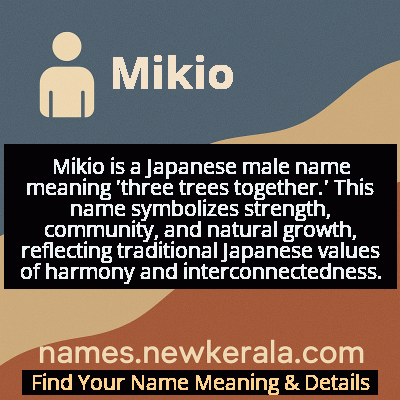Mikio Name Meaning & Details
Origin, Popularity, Numerology Analysis & Name Meaning of Mikio
Discover the origin, meaning, and cultural significance of the name MIKIO. Delve into its historical roots and explore the lasting impact it has had on communities and traditions.
Name
Mikio
Gender
Male
Origin
Japanese
Lucky Number
3
Meaning of the Name - Mikio
Mikio is a Japanese male name meaning 'three trees together.' This name symbolizes strength, community, and natural growth, reflecting traditional Japanese values of harmony and interconnectedness.
Mikio - Complete Numerology Analysis
Your Numerology Number
Based on Pythagorean Numerology System
Ruling Planet
Jupiter
Positive Nature
Optimistic, inspirational, and creative.
Negative Traits
Scattered, exaggerating.
Lucky Colours
Yellow, gold, purple.
Lucky Days
Thursday.
Lucky Stones
Yellow sapphire.
Harmony Numbers
1, 2, 9.
Best Suited Professions
Arts, writing, communication.
What People Like About You
Creativity, optimism.
Famous People Named Mikio
Mikio Narita
Actor
Renowned Japanese film and television actor known for his roles in samurai dramas
Mikio Oda
Athlete
First Japanese Olympic gold medalist, winning triple jump at 1928 Amsterdam Olympics
Mikio Aoki
Politician
Former Chief Cabinet Secretary and influential Japanese political figure
Mikio Sato
Mathematician
Pioneering mathematician known for hyperfunctions and microlocal analysis
Name Variations & International Equivalents
Click on blue names to explore their detailed meanings. Gray names with will be available soon.
Cultural & Historical Significance
In Japanese culture, the number three holds significant meaning, representing harmony and balance in many traditional arts and philosophies. The name carries connotations of traditional values while maintaining modern appeal, making it a bridge between Japan's rich heritage and contemporary society. It has been particularly popular among families with connections to nature, agriculture, or those valuing community bonds over individualism. The name's enduring presence in Japanese society reflects the continuing importance of nature symbolism and collective values in Japanese identity.
Extended Personality Analysis
Individuals named Mikio are often perceived as grounded, reliable, and community-oriented, much like the sturdy trees their name represents. They typically exhibit strong leadership qualities combined with a collaborative spirit, able to stand firm in their convictions while supporting others in their growth. Mikios are known for their patience and long-term perspective, approaching challenges with the steady determination of a growing tree.
They tend to be deeply rooted in their values and traditions, yet flexible enough to adapt to changing circumstances. Their strength often manifests as quiet confidence rather than overt dominance, and they frequently serve as stabilizing forces within their social and professional circles. Many Mikios display remarkable resilience in adversity, drawing strength from their connections to family, community, and cultural heritage. This combination of steadfastness and adaptability makes them valued members of any group or organization, embodying the ideal balance between individual strength and collective responsibility.
Modern Usage & Popularity
In contemporary Japan, Mikio maintains steady but moderate popularity, often chosen by parents seeking a name that balances traditional roots with modern sensibility. While not among the top-ranking names in recent decades, it enjoys consistent usage particularly in rural areas and among families with strong cultural ties. The name has seen some resurgence among younger parents appreciating its environmental connotations and community-focused meaning, reflecting growing ecological awareness. Internationally, Mikio remains relatively rare outside Japanese communities, though it occasionally appears in multicultural families or among enthusiasts of Japanese culture, maintaining its cultural specificity while adapting to global naming trends.
Symbolic & Spiritual Meanings
The name Mikio carries rich symbolic meanings beyond its literal translation, representing fundamental Japanese cultural concepts. The 'three trees' symbolize the essential balance between heaven, earth, and humanity - a core principle in Japanese philosophy. This imagery suggests strength through unity and interdependence, where individual resilience is enhanced by collective support, much like trees in a forest creating a stronger ecosystem together. The symbolism extends to represent growth, stability, deep roots in tradition, and upward reach toward new possibilities, embodying the ideal of maintaining cultural heritage while embracing progress and adaptation.

